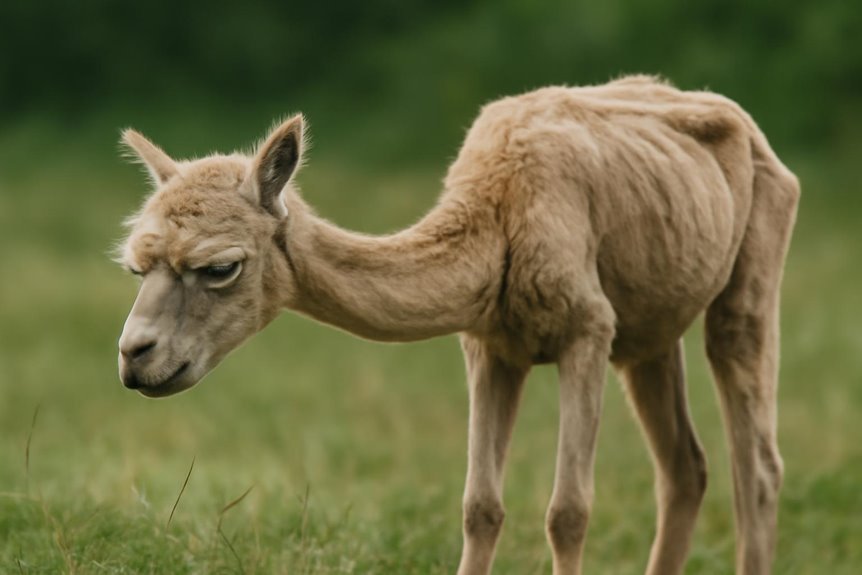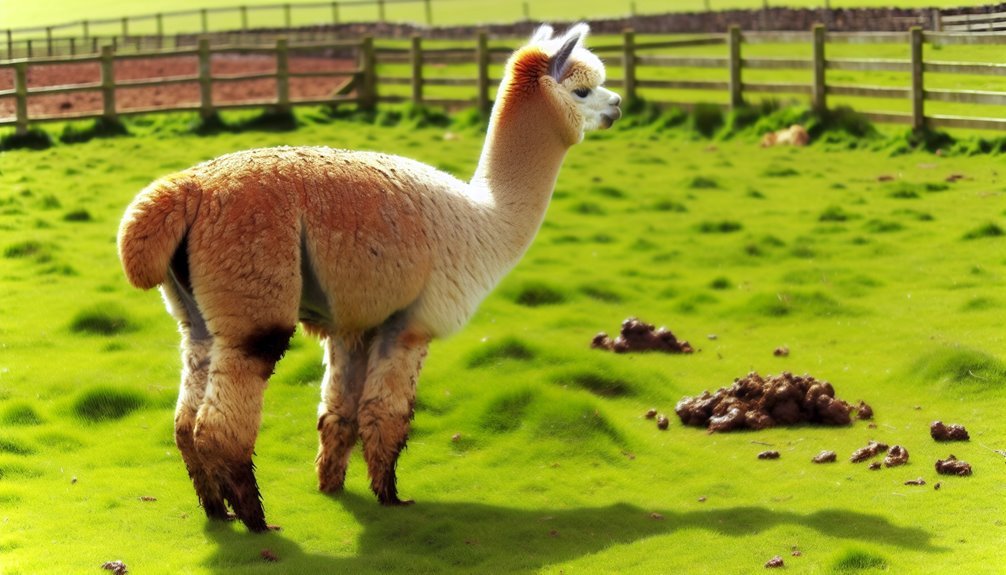Top 5 Signs Your Alpaca Has Digestive Issues
If your alpaca suddenly refuses to eat or loses weight, that’s a sign something’s wrong. Watch for diarrhea or watery stools, which could mean serious gut issues. Kicking at the belly, restlessness, or abnormal postures often point to colic or discomfort. Visible bloating or a pot-bellied look is a major red flag. Also, if your alpaca isolates itself or grinds its teeth, it’s likely in pain. Keep an eye out, and you’ll better understand how to help.
Key Takeaways
- Loss of appetite and noticeable weight loss indicate potential digestive distress in alpacas.
- Sudden diarrhea or changes to watery, mucus-covered stools suggest gastrointestinal problems.
- Signs of colic, such as restlessness, kicking at the abdomen, and abnormal postures, signal digestive pain.
- Visible bloating or abdominal distension with discomfort requires urgent veterinary attention.
- Behavioral changes like self-isolation, groaning, teeth grinding, and increased lying down indicate digestive discomfort.
Loss of Appetite and Weight Changes

How do you know if your alpaca is struggling with digestive issues? One of the earliest signs is a noticeable loss of appetite. If your alpaca shows reluctance to eat or decreased food intake, it may be experiencing gastrointestinal discomfort or pain. Alongside this, weight loss—whether gradual or sudden—often signals underlying health problems linked to digestion. Monitoring your alpaca’s body condition is essential; mature, non-pregnant animals should score between 2.5 and 3. Deviations from this range might indicate digestive distress. If you observe persistent signs like reduced appetite or significant weight loss, it’s important to consult a veterinarian promptly. Early intervention can prevent serious complications such as gastric ulcers or parasitism and help maintain your alpaca’s overall health.
Diarrhea and Changes in Fecal Consistency
What does it mean when your alpaca’s stool suddenly changes from firm pellets to watery diarrhea? This shift in fecal consistency often signals gastrointestinal diseases or infections, like parasitic infestations or enteritis. Watery stools might contain blood or mucus, and such changes in fecal output should never be ignored. Sick camelids with diarrhea may quickly become dehydrated and lethargic, making veterinary evaluation essential. In neonatal alpacas, infectious agents like rotavirus can cause diarrhea, while adults might face serious conditions such as eosinophilic enteritis. Mucus-covered feces can also hint at underlying colic or enteritis, so close observation is key. If you notice diarrhea or any abrupt changes in stool consistency, seek prompt medical attention to prevent complications and safeguard your alpaca’s health.
Signs of Colic and Abdominal Discomfort
When might you notice your alpaca showing signs of colic or abdominal discomfort? Common colic signs include kicking at the abdomen, restlessness, and unusual positioning like frequent lying down or rolling. You might also observe anorexia—your alpaca refusing to eat—and abnormal feces, such as mucus-covered or blood-tinged stools. Monitoring critical signs is essential; abnormal respiratory rates and heart rates can indicate serious complications. While abdominal distension often signals deeper issues, it’s important to watch for other subtle symptoms as colic signs can be transient. If your alpaca shows these symptoms, don’t delay veterinary intervention. Early detection and prompt care are important to prevent worsening conditions and safeguard your alpaca’s health and comfort.
Visible Bloating and Abdominal Distension

Although visible bloating in alpacas can sometimes seem minor, it often signals a serious buildup of gas or fluid, especially on the left side of the abdomen. Abdominal distension may cause a pot-bellied appearance, which is a clear sign of gastrointestinal distress. If you notice your alpaca showing signs of pain such as teeth grinding or frequent lying down, it’s critical to seek urgent veterinary intervention. Rapid assessment is essential to address potential fluid buildup or obstructions before complications worsen.
Key warning signs include:
- Abdominal distension paired with restlessness or kicking at the abdomen
- Visible bloating with a pot-bellied appearance
- Signs of abdominal pain, including teeth grinding and lethargy
Recognizing these symptoms early helps prevent severe digestive issues.
Behavioral Changes Indicating Digestive Distress
Visible bloating and abdominal distension often come with noticeable changes in your alpaca’s behavior. Behavioral changes like self-separation from the herd can signal discomfort or digestive problems. Pay close attention to appetite changes—reluctance to eat or loss of interest in food is a red flag. Vocalization changes, such as groaning or teeth grinding, often indicate abdominal pain or distress. You might also observe unusual postures or increased lying down, which suggest discomfort. Monitoring the dung pile is essential; altered fecal consistency or quantity can reveal underlying health issues. By closely watching these signs, you can detect digestive problems early and guarantee your alpaca receives timely care to avoid serious complications.
Frequently Asked Questions
How Do You Know if Your Alpaca Has a Stomach Ulcer?
About 70% of alpacas with stomach ulcer signs show decreased appetite affecting their alpaca feeding and fiber intake. Watch grazing habits and hydration importance. Manage stress factors, guarantee preventive care, and seek veterinary consultation for ulcer treatment and digestive health.
What Are the Symptoms of Coccidiosis in Alpacas?
You’ll notice symptoms like lethargy, weight loss, diarrhea, and weakness in young alpacas with coccidiosis. Prompt veterinary care, coccidiosis treatment, stress reduction, good nutrition, and environmental considerations are key for prevention and digestive health.
What Are the Symptoms of Colic in Alpacas?
If your alpaca’s acting uncomfortable or restless, it might be experiencing colic—a tummy trouble caused by diet or stress. Watch for pain indicators, stay on top of hydration, and consult your vet for treatment and prevention.
What Are the Symptoms of Worms in Alpacas?
If your alpaca shows weight loss, poor appetite, lethargy symptoms, or a dull coat condition, you’ll want to focus on worm prevention through regular fecal testing, parasite control, veterinary care, and a proper deworming schedule to maintain alpaca health.








Our picks
Alpaca & Wool Felted Sole Inserts: Comfy Upgrade?
Best Alpaca Socks for Hiking: Ultimate Comfort and Durability on Trails
Best Alpaca Halter for Comfort and Control